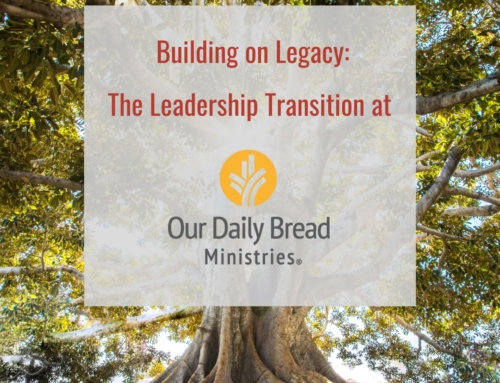What is God’s will for my life? Anyone who has ever led a small group or a Sunday school class of high school or college age students will recognize this as the most frequently asked question and the most popular topic of study. This article is not about that.
But it is about a parallel topic that seems to strike followers of Jesus Christ at virtually every age after college – from the entry level employee to the sage executive. How do I know my calling? While both questions stem from the same idea that “God loves me and has a wonderful plan for my life,” the question of calling places a sharp focus on aligning the Lordship of Jesus Christ with our career and vocation. My experience in executive search leads me to believe that there are four critical components to a calling, every one of which must be evidentially present for a calling to be certain.
Have you ever sat under a really bad teacher? Ever listened to a really bad singer? On a recent American Idol program, Randy Jackson looked at one pitiful contestant and said “This just ain’t your calling, dawg.” Whether you’ve ever watched the show or not, we all know what he meant. When the Lord calls someone to a role, He will give them a set of skills and, in certain instances, spiritual gifts that align with a calling. While training and practice will enhance core skills, no amount of perceived calling can overcome a clear deficit of abilities. When God called Moses to speak to Pharaoh, Moses did not have the requisite speaking skills, but Aaron did; God always provides the requisite skill set. A skill set is the first component of a calling, and the second component is desire.
One of my fears, as a young Christian, was that if I gave my life entirely to Christ as Lord, that He might fulfill my worst fear and call me to be a missionary to cannibals in some remote part of the world. But then a Christian friend relieved my fears by pointing out that every single missionary, anywhere in the world, actually wantedto be there – God had never violated their own will in calling them into His service. According to Psalm 37:4, Christians are exhorted to “Take delight in the Lord and He will give you the desires of your heart.” In those same early years, I actually read this verse and dreamed of the proverbial red Ferrari. But then I heard, in a bible class, another understanding of this same verse, pointing out that as we delight in God, He begins to place desires in our hearts…His desires for us actually become our desires for Him.
In studying Noah, we find that he must have been an adequate carpenter – he could understand the “specs” God gave him for an ark and knew how to pitch a boat. Then God put the desire in his heart by speaking to him directly, “Make yourself an ark with cypress wood; make rooms in it and coat it with pitch inside and out.” (Genesis 6:14) Noah was motivated, and “Noah did everything, just as God commanded him.” (Genesis 6:22) God put that desire in Noah’s heart.
God also put the desire into Jonah’s heart to go to Nineveh. We all know that Jonah was reluctant and he rejected and avoided God’s call – fleeing to Tarshish rather than succumbing to what he knew was God’s desire for his life. He had no desire to preach at Nineveh. But the Lord was not likely to let Jonah miss His calling. So many mature Christians with whom I speak are concerned that they will miss God’s calling in their lives, but our God is an awesome God who is not slow to show Himself strong on our behalf. By the time Jonah was vomited onto the beach out of the fish’s belly, we may rest assured that he had the desire to go to Nineveh, and it is clear that God worked circumstances to place that desire in his heart, and Jonah followed God to Nineveh. “The one who calls you is faithful, and he will do it.” (1Thessalonians 5:24)
As part of His calling, God will place the desire into the heart of the person to whom He has given a skill set to serve Him. I once heard one nationally known preacher proclaim, “If the desire to preach is not the call to preach, then I’ve never been called.” Calling is not comprised only of desire, but desire is the second component of a calling.
Both skill set and desire form the basis of a calling when they are joined to the third component, an opportunity. God gave both Paul and Peter the skill set and the desire to reach Gentiles, but then He determined to give them opportunity after opportunity to share the gospel among Gentiles. David was given the skill set of a king – he had a countenance that could only have been given him by the Lord, and he was given a desire to lead. Opportunity met that desire very early in his life, in the name of Goliath, and God used that opportunity to instill within David a visible platform for his calling as Israel’s future king.
David and Goliath, Noah and his ark, Ruth and Naomi, Daniel in prison, Philip and the Eunuch….nearly every Bible story is the history of God providing an opportunity to his followers to use their skill set, combined with the desires that he put in their hearts to bring glory to Him in their calling. Recognize that Daniel in prison did not necessarily realize that he was in the midst of fulfilling God’s calling, but he was using his skills (dream interpretation), he had a desire to serve and he somehow trusted that God would give him that opportunity. And yet, there is still a fourth component to a calling – there is always external confirmation.
When a person’s skill set and desire are joined to an opportunity and then externally confirmed, we may see the most obvious evidence of God’s calling. We were nearly two hours into the interview and the search committee had asked our candidate increasingly difficult questions…almost as if this had become a contest to stump the candidate. We had reached that inflection point, where the candidate had been asked and had answered what must have felt like every imaginable question. There was a pause, and then the oldest and wisest search committee member took off his glasses, looked straight at the candidate and asked, “How do you know that you are ’called’ to this role?”
The candidate paused, and then answered, ”I will not be sure that I am called to this role until you call me. God has given me a desire to serve here, but I will be fully assured that this is not His calling for me if you select someone else. On the other hand, if you, as led by the Holy Spirit, favor me with an offer, I will believe that this is where the Lord wants me to be.” The fourth and final element of a Christian calling is confirmation. God moves in the lives of multiple people and sows His desires not only into our hearts, but also into the hearts of search committee members, future bosses, etc., giving us an ample confidence that His calling is perfected in us when it is confirmed in another who has responsibility and authority for hiring us or affirming our suitability for a role.
Had Boaz not selected Ruth, the bloodline of Christ would surely have been preserved, but we would not have known Ruth’s name and we would have had no reason to believe that she had been called to that purpose. If Samuel had selected one of David’s brothers or if Goliath had killed David, we would most certainly know that David was not called to be king. What would we say about Daniel if his dream interpretations had been all wrong? He might still be a godly man, but he would have ended his life in prison and we would have known that God did not call him to find favor for His people in the eyes of the king. If all of the animals had drowned while watching Noah float off in his ark, we would not only have an awkward bedtime story, we would know that Noah was not called by God to preserve His creation. But Boaz did choose Ruth. Samuel did select David. Goliath did drop dead. Daniel’s interpretations were spot on. The animals lined up and walked into Noah’s ark. Because God is committed to accomplishing His will in the life of His faithful servants, there is always an external confirmation to the calling of God…always.
I thought with all of my heart that God was calling me to preach…to pastor a church. I left Georgia Tech to attend Bible College and then went to seminary. I was ordained, believing I was to pastor and believing that was my calling. At the age of twenty-five, I had planted a church and was the “senior pastor.” I am not sure whether the church failed or whether I failed but I was not good at pastoring and eventually, in great angst and frustration, I left the ministry and began a career in executive search. Knowing that “the gifts and calling of God are without repentance” I suffered for years, believing that I was outside of God’s will and had missed my plan…His calling in my life.
As I continued to work in the recruiting field, my skills in search grew. As I continued to serve the Lord in helping to start a church, teaching Sunday school classes and on ministry boards, I continued to pursue my desire to have His peace in the area of my calling. Desire and skill set were there – but I did not have the peace of understanding why I had failed in ministry.
But then opportunities began to develop and a wonderful ministry called Generous Giving asked me to assist in the search for their President. I did not realize it at the time but God was actually calling me to this field of executive search and when the board of Generous Giving selected me to assist them, they were providing the necessary confirmation to His calling. God has provided subsequent indications of confirming my calling through Christian colleges and universities and ministries with whom I have had great privilege to assist in their leadership selection.
Hebrews 11 gives story after story of people in the Old Testament who, by faith, pursued God’s calling having no idea what God was doing or what He was going to do with their lives. They trusted that He would accomplish His plan for them in life and in death; and in following they lived out the calling that we now understand to have been His “perfect will” for their lives. He sowed into their lives various skills, desires and opportunities for service, and then confirmed their work by what He accomplished in their lives…whatever it was. As each of us search for God’s will for our lives and his calling for our work, let us rest in Paul’s promise to the Thessalonians – “Faithful is he who calleth you, who also will do it!”





